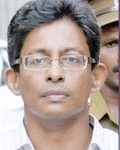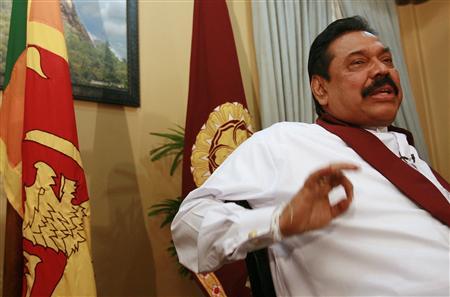–

Sharmini Serasinghe
In Sri Lanka today there are two types of Buddhists- the Buddhist Moderates who identify themselves as Sri Lankans and those who identify themselves as Sinhala-Buddhists which they regard as their nationality!
As a Sri Lankan (a Sinhalese and a Buddhist by faith) I have lived and worked amidst the strange practices of Sinhala-Buddhists in Sri Lanka. As such I have observed closely what a Sinhala-Buddhist is as opposed to a Buddhist Moderate.
The following are my observations.
Buddhist Moderates (Sri Lankans) – This group identifies themselves by their nationality- Sri Lankan. Their ethnicity and faith are on a need-to-know basis, usually for official purposes. Moderates understand and respect Buddhism as a philosophy and quietly practice their faith in daily life to the best of their ability. Therefore they respect the religious beliefs and ethnicity of the ‘other’ (Hindus, Christians, Muslims etc) and treat them all as equals.
The Sinhala-Buddhist- This group carries a double-barreled identity; ethnicity first followed by the faith- Sinhala-Buddhist. As such they wear their identity on their sleeve with unfounded pride. This group has heard about the Buddha’s teachings- the Dhamma but don’t practice it. But they do practice a ‘religion’ which they call Buddhism that is diametrically opposed to the Dhamma. To these Sinhala-Buddhists the noble teachings of the Buddha are akin to casting pearls before swine!
The Sinhala-Buddhist regards Buddhism as a ‘religion’ and not as a philosophy and a way of life, as advised by the Buddha. Therefore they regard the Buddha as a God and practice their ‘religion’ by worshiping and venerating Buddhist symbols and objects; totally against the Buddha’s teachings.
Unlike Sinhala-Buddhists, Buddhist Moderates regard the Buddha as their noble teacher and Buddhism as a way of life. They don’t worship Buddhist symbols like Sinhala-Buddhists do, as for them Buddhism is not a religion. The Buddhist Moderate has the highest regard for the Buddha and respects his teachings by striving to live according to those noble teachings unlike the Sinhala-Buddhist label bearer.
Therefore these two groups- the Buddhist Moderates and Sinhala-Buddhists practice Buddhism in two extremely different ways. In today’s context the latter reeks of bigotry, hypocrisy and chauvinism in the extreme. To the Moderate Sri Lankan Buddhist, what the Sinhala-Buddhist practices as ‘Buddhism’ is a type of heresy of the Dhamma!
The Good Buddhist
The Sinhala-Buddhist’s idea of being a ‘Good Buddhist’ is confined only to one day of the calendar month- Full Moon (Poya) day. This day is dedicated to worshiping symbols and objects. As the ‘done’ thing they visit the temple, worship and heap flowers opposite the perceived image of the Buddha, light oil lamps and drench the roots of an over hydrated Bo tree within the temple premises. Then they parrot off the five-precepts with no intention of abiding by them. Most don’t even understand the meaning of them.
All this is done because it is the ‘done’ thing or with the foolish and selfish motive of gaining perceived ‘pin’ (merit) to counteract the ill-effects (or so they believe) of the crimes they commit. It never crosses their minds to question how a tree, clay, concrete or stone object could pardon them or grant them merit. But it is the ‘done’ thing so they do it, though they do not know why they do it. For them this is practicing ‘Buddhism’!
Also on Poya Day, the usually carnivorous Sinhala-Buddhists refrain from eating fish, meat and eggs. This is another ‘done’ thing which has nothing to do with the Dhamma. However some of these ‘Buddhists’ believe that refraining from consuming animal flesh is the ‘Buddhist’ thing to do, therefore bestowing more merit on themselves.
It must be said that all these acts are harmless in themselves if not for the hypocrisy involved!
There is a popular misconception that the Dhamma prohibits followers from consuming animal flesh. In fact, the Buddha did not ‘prohibit’ his followers from doing so, if it is offered by a person in good faith. But he did advise his followers against seeking it and destroying life for it. Buddhist Moderates who refrain from consuming animal flesh do so either for health or ethical reasons.
So in typical Sinhala-Buddhist style, commercial establishments are banned by the State from selling meat on Poya Days. This applies to the sale of alcohol as well. But on the days preceding this ‘sacred’ Day, one may store as much animal flesh in their refrigerators as required and sufficient alcohol to see them through the days of prohibition.
Most often Sinhala-Buddhists are the first customers at meat stalls and taverns before the day of ‘prohibition’ dawns. So, for whose benefit and for what purpose are such prohibitions imposed? Who is trying to fool whom? This is Sinhala-Buddhist state-sponsored hypocrisy!
Also on Poya Day a few even try to refrain from consuming alcohol, lying, stealing, sexual misconduct or murder/killing- the five precepts. But this is all confined only to Poya Days. Convinced and content that they have accumulated sufficient ‘pin (merit)’ to see them through all their misdeeds in the future, life returns to normal the rest of the month!
Insecurities of Sinhala-Buddhists
The average Sinhala-Buddhist suffers from an acute inferiority complex which is often mistaken for a superiority complex. This could be attributed to a lack of substance in the superficial ‘religion’ they practice by worshiping objects and symbols and a lack of knowledge of the Dhamma.
Besides wearing their identity on their sleeve, a relatively recent ‘fashion’ adopted by Sinhala-Buddhists is the way in which they wear the ‘Pirith Noola’ (Pirith blessed thread) on the right wrist. Instead of the customary three folds of white cotton thread, we now see them ‘exhibiting’ on their right wrist what looks more like ‘Pirith bandages’. This is usually observed amongst Sinhala-Buddhist political VIPs.
This new phenomenon could either be to draw attention to their Sinhala-Buddhist identity and superiority over the ‘other’ or to ensure foolishly imagined ‘divine protection’ as they carry on accumulating negative ‘karma’ through their hypocrisy. In some cases it also could be a combination of both.
Sinhala-Buddhists live in constant fear of their ‘concrete/clay/stone made’ religion which they call ‘Buddhism’ being destroyed. As is obvious to any right thinking individual, all material objects, including Buddhist symbols are vulnerable to natural phenomena and destructive humans.
To the Buddhist Moderate, such fear is unfounded as their faith is strong. It lives and grows within them therefore it can never be destroyed either by destructive humans or natural phenomena. Buddhist symbols don’t carry any weight with the Buddhist Moderate except for the archeological value of some.
Insecurity harbored by Sinhala-Buddhists is nothing new to Lanka. It goes back to ancient times of the Cholas and more recently to pre-independent Ceylon when the British introduced Christianity to the island. The likes of Anagarika Dharmapala (a Sinhala-Buddhist personified) claimed that Buddhism was being destroyed by the British and Sinhala-Buddhists were being forced to convert to Christianity!
The question arises here if anyone could be ‘forced’ to change their faith/religious belief for whatever reason if the person is strong in her/his belief? But that is another subject altogether.
Sinhala-Buddhist Politics
Usually Sinhala-Buddhists practice their ‘hypocrisy’ amongst themselves without causing too many problems for the rest of society. They denigrate those of other ethnic groups and religions behind their backs, but are sweet as honey to their faces. This is only until a Sinhala-Buddhist political regime takes over and starts whipping up ethno-religious emotions for their own political gain. It happened with the late S.W.R.D. Bandaranaike and it is happening now!
Today, in place of Anagarika Dharmapala and S.W.R.D. Bandaranaike we have Sinhala-Buddhist Warlords to carry on the tradition!
This malaise has now brimmed over to extreme proportions. We now have Sinhala-Buddhist saffron-robed thugs masquerading as Buddhist monks denigrating the Buddha and his noble teachings in every possible way. Sinhala-Buddhist parents and teachers are encouraged to teach their young how to denigrate those of other religious faith from an early age. These saffron robed groups appear to be paramilitaries of the Sinhala-Buddhist chauvinistic State who use the sacred Saffron robe as a weapon over the ‘other’- those of other faiths.
Strangely this phenomenon burst forth post 2009 and today Sinhala-Buddhists see ‘demons’ everywhere threatening Buddhism in Sri Lanka!
This could be attributed to the political environment we live in today which is besieged by insecurities of various forms. After the successful elimination of LTTE terrorism, our warlords seem to find it necessary to create another ‘monster’.
This could be to keep the voter on edge and in constant fear and, therefore, to keep them reminded that only ‘they’ and ‘they’ alone have the ability to keep the country safe from the likes of Prabhakaran and other such ‘monsters’. This they believe is the surest way of keeping the Sinhala-Buddhist voter terrified and forever grateful to the Warlords for keeping them safe.
So today we find new concrete ‘Buddhist symbols’ sprouting like mushrooms throughout the country, especially in areas populated by the ‘other’ (Hindus, Christians and Muslims). This is the Sinhala-Buddhist chauvinistic way of claiming superiority over the ‘other’. Not stopping there, they go on to destroy places of religious worship of the ‘other’.
The Buddhist Moderate looks on in horror and revulsion as these acts go totally against the Buddha’s teaching of sympathetic understanding and respect for other religions!
So today while overtly paying lip-service extolling the virtues of the Buddha, Dhamma, Sangha and religious harmony, the Sinhala-Buddhist Warlords covertly give full reign to terrorizing the ‘other’.
All this ugliness takes place in this so called thrice-blessed Buddhist country Sri Lanka!
*Sharmini Serasinghe was Director Communications of the former Secretariat for Coordinating the Peace Process (SCOPP) under Secretary Generals Jayantha Dhanapala and Dr. John Gooneratne. She counts over thirty years in journalism in both the print and electronic media.




